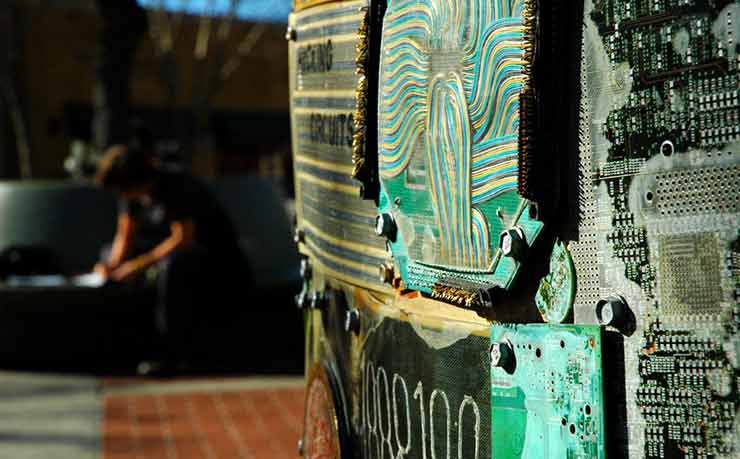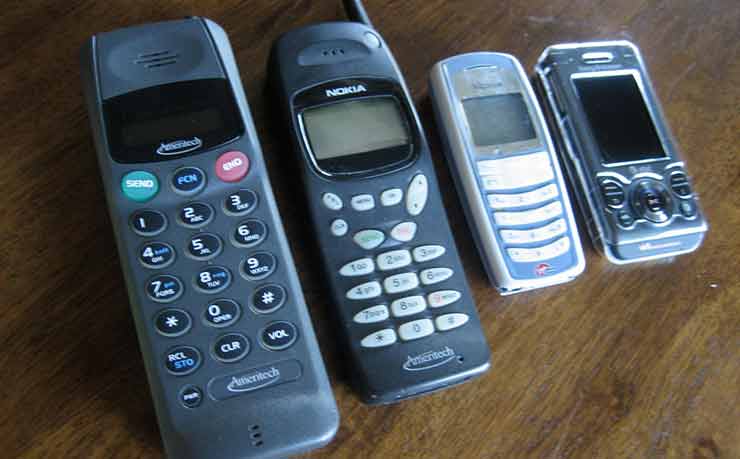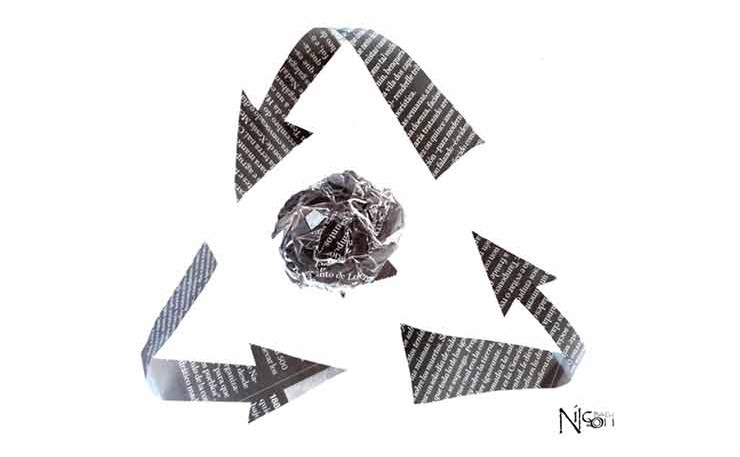While the battle to reduce landfill rages on, so does the fight to raise awareness about what we’re putting in there, and shouldn’t be. Kathryn Lewis explains.
Humans are creatures of habit, and waking up and enjoying a cuppa before the day’s activities is an essential part of daily life for most Australians.
But what happens once the kettle stops working, do you step back in time and boil water on the stove, or go straight out and buy a new one?
Australian households are estimated to have on average 22 electrical appliances. When these fall into disrepair, most will end up in a cupboard for a few months or even years before being chucked in the bin. What happens next is probably not what most of us ponder over our morning coffee.
Electrical refuse or e-waste is officially classified as hazardous – these items are filled with chemicals that leach into the soil and air when dumped in landfill and cause problems for human health and the environment.

Every light bulb we toss away contains mercury, our printers are filled with cancer-causing cadmium and our batteries are loaded with lead, lithium and nickel.
These chemicals and heavy metals, when used in the way they were created for consumers, are not a major cause for concern, but when broken down can lead to an array of health issues.
Between 95-98 per cent of these products are recyclable.
Lead and glass can be reused to manufacture new TVs and computers; circuit boards can be taken apart and become new jewellery, or be reborn as computer chips; scrap metal can be melted down to start life again; cables and plastics can be processed to be used in new products; and toxic materials can be disposed of safely.
E-waste is growing three times faster than any other kind of waste, with every Australian throwing away about 20kg each year, according to a 2014 United Nations report (this does not include items left in cupboards and garages).
The short lifespan of products encourages people to replace a broken item with something brand new, rather than considering having the old one repaired.
Former journalist Erin Lewis-Fitzgerald recognised this as a major issue and decided to act, founding Bright Sparks as a pilot project in 2015 with the aim of reusing, repairing and recycling electrical appliances.
The social enterprise began in a tiny side street in Hadfield, in the Moreland Council area. Within two weeks, Bright Sparks was buried in waste, and its popularity only grew from there. Ms Lewis-Fitzgerald said she seriously underestimated how much junk Australians were willing to get rid of.
A first for Melbourne, the enterprise gave consumers three options: to donate their electronics for recycling; to pay to have their products repaired; or to donate items that could be repaired and resold.
“One of the reasons I was so interested in the idea of Bright Sparks was the fact that you can put a toaster in the rubbish bin if you want to, it fits in there … with the little stuff, you might try, but how much time you’re going to spend with it who knows, and then you pray to the environment gods and say I’m sorry,” Ms Lewis-Fitzgerald said.
When the pilot program ended last year, Lewis-Fitzgerald and her colleagues started working on Bright Sparks 2.0, based on everything they’d learned in the pilot program. Donations are also now tax-deductible.
“The enthusiasm was so big for what we did, and there is so many people who love us that it’s kind of worth… giving it another go, or at least trying to do what we can to make it happen,” Lewis- Fitzgerald said.
New isn’t always better
Recycling e-waste is an effective way to reduce toxic waste entering the environment, although extending the life-span of electrical items is an even more eco-friendly option.
London based company The Restart Project was a driving force behind Ms Lewis-Fitzgerald’s Melbourne project.
The organisation throws parties across the UK, bringing together tech whizzes, rookies and owners of broken appliances and working out how to fix them together.
Party host Tim Shand said the sentimental nature of electronics was quickly being lost and the parties were a great way to reignite that idea.
“When people get something fixed that they’re attached to, that’s really amazing. It’s easy to think now that electronics are cheap and disposable but most of us have some electronic devices we’re genuinely attached to, and we will be sad if it gets to the point where we don’t have a choice but to throw it away,” he said.

Environment advocacy charity Total Environment Centre executive director Jeff Angel said waste avoidance was a high priority for “a sustainable society”.
“It’s not easy given the powerful influence of marketing and focus on growing short-term sales and business income,” he said.
Many major telcos offer consumers a brand-new handset every 12 months as part of a contract, which Mr Angel called “planned obsolescence”.
“It spends too many resources on short-term sales and not enough on building long-term infrastructure and investing in social and environmental policies,” he said.
A national scheme
In 2011, the federal government stepped up and made the biggest producers of e-waste accountable under the National Television and Computer Recycling Scheme (NTCRS).
The scheme is based on the idea that both producers and government regulation are needed to lessen the impact of e-waste on the environment. It is funded by importers and producers of TV and computer products who are required to ensure consumers have access to e-waste collection and recycling.
Four organisations have partnered with manufacturers to create more than 600 free drop-off points nationwide, which accept computers, televisions, printers and computer-related products such as chargers.
The targets of the scheme were increased in 2015 by about 10,000 tonnes; over four years this is expected to recycle an extra 32,000 tonnes of e-waste.
Compared to the 138,000 TV and computer products sold in Australia in 2007/8, this is a meagre target.
The Australian Council of Recycling (ACOR) strongly supports the scheme, but argues that the federal government should provide more assistance to state and local initiatives outside of the NTCRS.
“It is impossible to purely rely on local government efforts to meet the substantial shortfall in funding recycling,” ACOR said in a letter to the Department of Environment.
Government-accredited not-for-profit Mobile Muster also works to reduce e-waste in landfill by collecting mobile phones via post and drop off points nationwide. The organisation is run by the Australian Mobile Telecommunications Association on behalf of Australia’s biggest telcos including Telstra, Samsung, Optus and Vodafone.

This program is one-of-a-kind around the world. Unlike the NTCRS, it is a voluntary scheme which mobile manufacturers and service providers sign on to. Since it started 18 years ago, more than 10 million phones have been collected and recycled in Australia.
The program is regulated under a concept known as product stewardship, as with the NTCRS. Product stewardship is the idea that anyone involved in producing, selling and using a product should also be involved in its disposal.
The national scheme covers the most prevalent e-waste in Australia, but does not address other everyday household appliances.
There are drop-off points not associated with the NTCRS that will accept any form of e-waste, however there can be hidden costs attached, and sometimes distant, rural locations that make them inconvenient for many people.
Mr Angel said there was still more work to do.
“It’s still not easy enough [for consumers]as the national TV and computer scheme has quotas that restrict the amount recycled and therefore the accessible facilities,” he said.
More than computers and TVs
Lack of time, and knowledge of the effects of wrongly disposing of household appliances are key contributors to the tonnes of waste heading to landfill.
Lewis-Fitzgerald said a lack of advertising and signage was standing in the way of recycling initiatives.
“If you do provide a recycling service, what is your obligation to promote it? It doesn’t really matter to them [corporations]if they promote it, because they’re doing it and they can say, this many stores have recycling bins.…
“If you actually put the proper effort in, then you can end up with mountains of stuff, like Bright Sparks.”
Officeworks’ Bring IT Back campaign advertises that consumers can return their old printer cartridges, batteries and computers to any Officeworks stores; however, when I called stores to check the availability of the service in Melbourne, only Cheltenham and Highett stores would accept the products.
“A lot of people came to us with printer cartridges, and I thought, well, of course any Officeworks can recycle your printer cartridges, but then when you actually go to Officeworks to do it, it’s really hard to actually find the bin. It’s not clearly signed,” Lewis-Fitzgerald said.
Planet Ark lists a comprehensive guide to where you can recycle computers and accessories in Melbourne on its website.
Leading by example
In global terms, Australia is not doing too badly. South Australia has had e-waste banned from landfill since 2012. This has inspired the Victorian Government to consider the same legislation.
South Australia’s Environment Protection Authority (EPA) says the community are avid recyclers, who have responded positively to the ban which ensures a more regular flow to e-waste recyclers.
“E-waste recyclers have been very supportive of the ban as it increases material flowing to them with consequential business benefits while, for landfill operators, it had negligible impact given less than 2 per cent of total waste comprised e-waste,” the EPA said.
Enforcing the ban is aligned with banning products that can easily be thrown in the garbage bin. The EPA state inspections of waste sites have found separate collection and recycling is working, so far.
“Councils and the waste industry have worked to support the ban. There has not been any evidence put to the EPA of any increased illegal dumping of e-waste,” the EPA said.
The Victorian Government proposed the ban early last year. It is still in the early stages with implementation and expected to begin in early 2018, according to the Department of Environment, Land, Water and Planning.
The ban will “support jobs in the recycling industry and grow economic opportunities” Parliamentary secretary for Environment Anthony Carbines told The Age.
Lewis-Fitzgerald thinks a ban could help small organisations like Bright Sparks get the message out to consumers.
“It might also help us when we’re trying to raise awareness and educate people, because we can say this is actually banned, it’s not just a thing you shouldn’t do,” she said.
Donate To New Matilda
New Matilda is a small, independent media outlet. We survive through reader contributions, and never losing a lawsuit. If you got something from this article, giving something back helps us to continue speaking truth to power. Every little bit counts.






